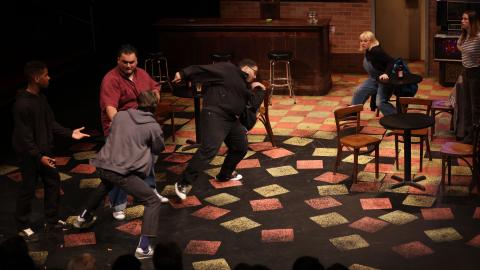Major and Minor in Theatre
Upload our Behind the Scenes Student Handbook
Use the QR code below to get a copy of our Department Student Handbook which details all the information a new incoming student needs to know about our program!
Requirements for Theatre Majors
12700: Voice for the Actor (3cr.)
13100: Introduction to Theatre Arts (3 cr.)
13200: Body Movement (3 cr.)
13400: Theatre Production and Design (3 cr.)
13600: Acting I (3 cr.)
21100: Theatre History I (3 cr.)
21200: Theatre History II (3 cr.)
21300: Theatre History III (3 cr.)
23300: Directing I (3 cr.) - Fall Semesters Only
23702: Technical Theatre Practicum (2 cr.)
33100: Playwriting (3 cr.)
33300: Directing II (3 cr.) - Spring Semesters Only
PLUS: Six credits from Theatre Elective Courses
(Please Note: Only one Theatre History course can be taken in any semester)
TOTAL CREDITS for B.A. in Theatre: 41-43 (average of 42)
Requirements for Theatre Minors
13100: Introduction to Theatre Arts (3 cr.)
13600: Acting I (3 cr.)
PLUS: Nine credits of Theatre Elective Courses
Theatre students are urged to supplement their required courses by studying related subjects in the Theatre Department as well as in other programs and departments, including singing, film and video directing, painting and sculpture, Shakespeare, and literature.
How to Declare a Theatre Major
You do not have to audition to be a Theatre Major. Once you are admitted to City College, simply fill out a major form with a Theatre Department advisor to declare your Theatre Major. Please visit the Theatre Office in Compton Goethals, Room 311 for help with filling out a Major/Minor Form.
IF YOU'D LIKE TO COME TO CCNY FOR A TOUR AND PERSONAL INTERVIEW, e-mail us at: chair@ccny.cuny.edu and we will gladly get back to you to arrange an appointment.
Theatre Tracks
Beyond the required courses, theatre majors are welcome either to take electives as they wish or to follow one of the designed Tracks below in their area of interest. Students who choose a Theatre Track can also take additional electives, and are not limited to the ones in their track.
Acting Track
23600: Acting II (3 cr.)
33000: Performance Practice* (2 cr.)
*Students must be cast in a production through departmental audition process.
PLUS: Two courses from among the following for 6 credits:
23601: Acting 3
23602: Acting 4
23800: Musical Theatre Workshop
23900: Acting for the Camera
24000: Stage Combat
43200: New Play Collaborations
OR other acting-related electives
Design and Technical Theatre Track
26000: Lighting Design (3 cr.)
26100: Costume Design (3 cr.)
26200: Set Design (3 cr.)
37200: Special Problems in Technical Theatre (3 cr.)
Directing Track
23703: Technical Theatre Practicum* (3 cr.)
37000: Special Problems in Directing** (3 cr.)
43200: New Play Collaborations (3 cr.)
*Students either stage manage or assistant direct a student or faculty-directed production
**Students register for this upon acceptance by a faculty committee of a proposal for an advanced directing project
And Strongly Recommended:
23600: Acting II (3 cr.)
Musical Theatre Track
21500: Musical Theatre History (3 cr.)
23800: Musical Theatre Workshop (3 cr.)
PLUS: One class selected from the following:
25000: Ballet (3 cr.)
25100: Jazz Dance (3 cr.)
25200: Modern Dance (3 cr.)
31300: Hip Hop (3 cr.)
Playwriting Track
33200: Playwriting 2 ( 3 cr.)
37100: Special Problems in Playwriting (3 cr.)
43200: New Play Collaborations (3 cr.)
PLUS: Two courses from the following Theatre History and Dramatic Literature Series for 6 credits:
21500: Musical Theatre History
21600: Non-Western Drama
21700: Queer Theatre
21800: American Jewish Theatre
21900: Theatre of the Sixties
22300: Theatre into Film
23200: Black Drama in the USA I
23201: Black Drama in the USA II
25500: Youth Theatre
Theatre History and Dramatic Literature Track
Choose: Four courses from among the following for 12 credits:
21500: Musical Theatre History
21700: Queer Theatre
23200: Black Drama in the USA I
23201: Black Drama in the USA II
31113: Contemporary African American Female Playwrights (3 cr.)
Frequently Asked Questions
Can a student Major in Theatre?
Yes! We offer a well-rounded program, consisting of approximately 42 credits of coursework.
Do I need to audition to become a Major or Minor?
No! Simply see a departmental advisor, or our Director of Administration to fill out a major/minor form.
How will I know which classes to take?
Once you've declared a Theatre Major or Minor, you will be assigned an Advisor. You should see your Advisor at least once per semester, and they will help you make your course selections.
How do I work through my coursework toward graduation?
We suggest that you take the 100-level courses first, and meet with your Advisor regularly, to plan a workable schedule each semester.
What if I want to take Theatre and another major too?
You can! Many students are dual majors, majoring in Theatre and another subject. Double majoring may mean that you spend an extra semester or year here at City College.
When are the auditions for your productions?
Our General Auditions are held during the first full week of each semester. There are also auditions in March for the Spring One-Act Festival which takes place in May, as well as auditions for other projects throughout the semester. Please follow us on Insta: ccnytheatredepartment to be notified of our auditions.
Can anyone be cast in your productions?
Any student enrolled at City College may audition and be cast. We believe that taking acting classes will greatly enhance your chances of being cast, and we do consider our Majors and Minors first in casting.
Are there any opportunities to work backstage?
Absolutely! Through our Theatre Practicum course we are able to offer tech, design, crew, and stage management opportunities to our students.
Last Updated: 01/26/2024 09:53


